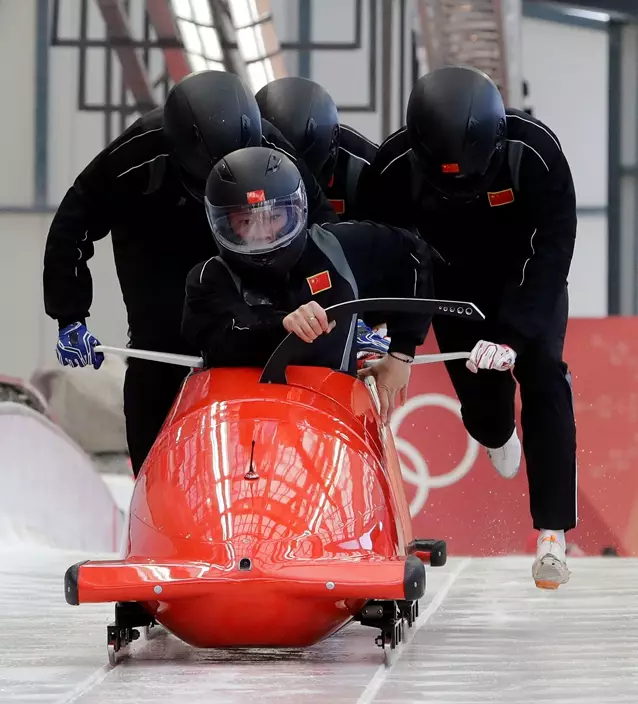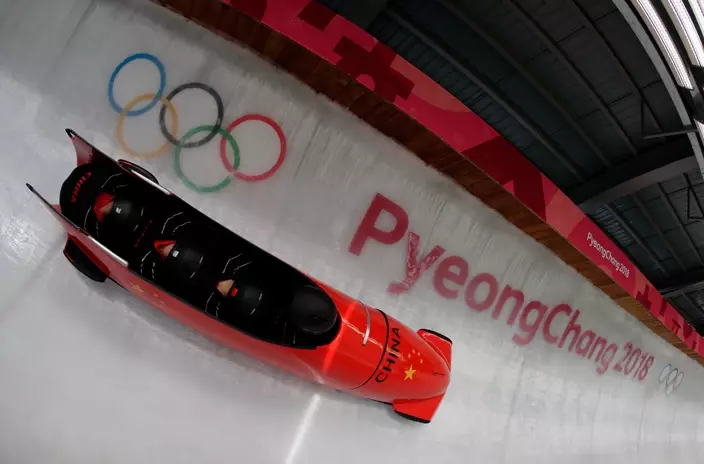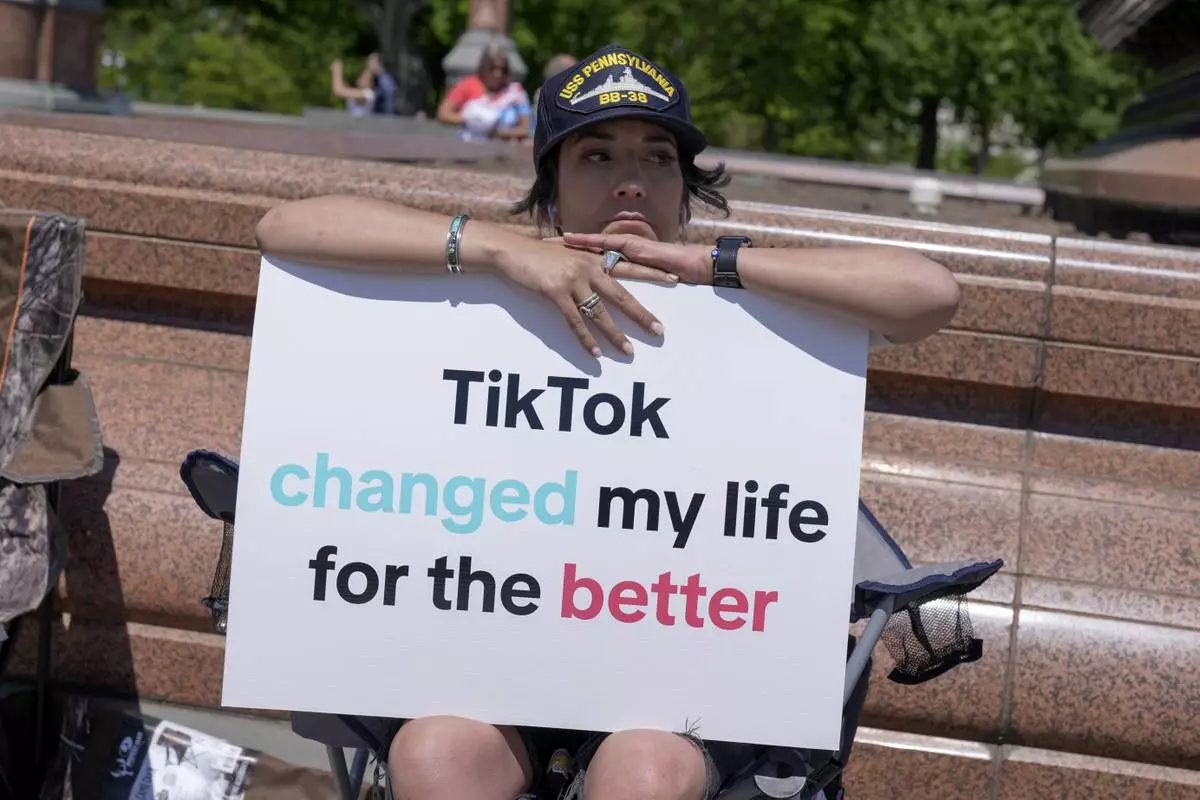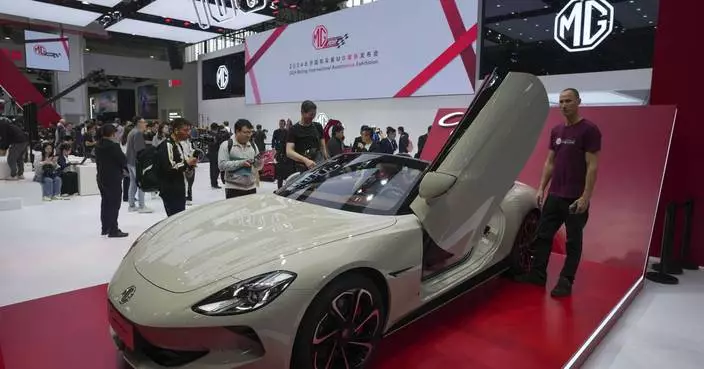At least Jeff Pain knows what is expected of him.
Hired by China for his coaching expertise in the winter sport of skeleton, the Olympic silver medalist for Canada in 2006 has four more years to shape his rookie team of Chinese athletes into ice-sliding champions at the 2022 Winter Games in Beijing.

Driver Shao Yijun, Shi Hao, Li Chunjian and Wang Sidong of China take a practice run during training for the four-man bobsled competition at the 2018 Winter Olympics in Pyeongchang, South Korea, Thursday, Feb. 22, 2018. (AP Photo/Wong Maye-E)
"We've been told it's gold or nothing," Pain says. "The other medals are irrelevant."
Here's the rub: Wanting to win in dangerous, technically complex sports on snow and ice and actually being equipped to beat established winter-sports powers are very different things.
"It's not just about putting on a pair of shoes and being fast," Pain says of skeleton. "You have to be able to bend over, grab a sled, run as fast as you can, dive on it and then get to the bottom without dying."
The blueprint of throwing money and foreign know-how at hand-picked Chinese athletes is familiar. But results in 2022 are on course to be less spectacular than when Beijing hosted the Summer Games in 2008. Then, a costly, years-long national medal-mining drive paid off handsomely, with China surging to the top of the gold-medal bragging table.
Chinese Winter Olympians, however, have far bigger leaps to make. Although competitive in a scattering of events, the world's second-largest economic mega-power after the United States has never been a major winter-sports player. China's team of 80 athletes in Pyeongchang — its largest since the 2010 Vancouver Games — has, like Team USA, been a striking under-achiever, with just one gold among its nine medals.
As it did for the Summer Games, China has brought foreign coaches on board in array of winter sports, tapping Dutch expertise in speedskating, for example, and Norwegian know-how in cross-country skiing.

Wu Dajing of China celebrates after winning the men's 500 meters short track speedskating A final in the Gangneung Ice Arena at the 2018 Winter Olympics in Gangneung, South Korea, Thursday, Feb. 22, 2018. (Paul Chiasson/The Canadian Press via AP)
Hired in 2015, the year the IOC picked Beijing as the first city to host both summer and winter games, Pain saw China as a land of promise.
"My initial thought when I took this job was: 'Oh my gosh, China has got 1.3 billion people. Let me look at 30,000 of them, and from that we'll pick 50, and from that we'll find 10 unbelievably good ones."
Reality has been sobering. In recruiting for skeleton, Pain found himself promoting a sport almost completely unknown to 130 athletes who turned up for his first tryouts.
"They Googled skeleton to see what it was. A couple of the kids I've got on my team had never seen snow, because they are from southern China," he said. "They are signing up for something they literally have no idea what it is."
And his top picks all subsequently quit before starting training.
"I think two of the three quit because they Googled skeleton, figured out what it was and said: 'Uh, no, no thank you.' And I know one of them quit for sure because his girlfriend wouldn't let him go."
Manuel Machata, the German coach hired to build China's rookie bobsleigh team, faced similar challenges.
"They never had bobsleigh before. It's not famous. It's not well-known. It's very hard to get people to bring athletes in," he said. His initial group of 24 recruits got their first taste of what they'd let themselves in for when he took them to Whistler, Canada, in 2016.
"That was incredible," he said. "They saw the track and they were flushed. Then you sit them in a sled and let them drive down. That's quite amazing."
He, too, says Chinese officials want him to produce medal-standard bobsledders by 2022, but adds: "You only can do what you can do."
There have been Chinese breakthroughs and notable performances in Pyeongchang.
Twelve years after its Olympic debut in the sport at the 2006 Turin Games, China got its first snowboarding medal, with silver in women's halfpipe from Liu Jiayu. In a not-untypical path for Chinese Winter Olympians converted to snow and ice from other sports, she practiced martial arts as a kid. Her initiation to halfpipe included trampoline-jumping with a snowboard strapped on.
In short-track speedskating — by far China's strongest winter sport, producing 30 of its 53 Winter Olympics medals coming into South Korea — Wu Dajing lowered his own world record in winning the men's 500 meters.

Driver Shao Yijun, Shi Hao, Li Chunjian and Wang Sidong of China take a curve during training for the four-man bobsled competition at the 2018 Winter Olympics in Pyeongchang, South Korea, Friday, Feb. 23, 2018. (AP Photo/Michael Sohn)
With bronze over 500 meters, Gao Tingyu also became the first Chinese man to medal in Olympic long-track speedskating. And there were Chinese participants for the first time in several events, including Chang Xinyue's 20th place in women's ski jumping.
Li Chunjian, who drove one of two Ferrari-red first-time Chinese entries in two-man bobsleigh, said Pyeongchang was only "the first step" for their fledgling team.
"Very quickly, at the next competitions, we'll steadily grab the attention of people around the world and let them know that Chinese bobsledding has arrived," he declared confidently, after placing 26th of the 30 sleds. "Everyone is working hard together to prepare for 2022."
His brakeman, Wang Sidong, added: "Two years ago, we didn't even know what bobsledding was."
Still, overall, China is trending downward. From its high of five golds in 2010, China slipped back to three in 2014 and now just one — Wu, in short-track — in Pyeongchang.
"I'm sure the leadership will be quite upset," Pain said. "It will be interesting to see what happens in China with their sports system and coaching system and the whole thing in the next few months, because there's probably a big old shakedown coming."
In skeleton, where China was represented for the first time by Geng Wenqiang, "we are way behind, to be honest with you," Pain said. "We haven't had that quick and robust start that we needed three years ago."
Chinese bureaucracy has slowed progress, with paperwork delays causing athletes to miss races that could have helped more of them qualify for Pyeongchang, he said.
"So much red tape," he said. "I kind of joke that every decision takes five approvals and every approval takes a month."
"The question is: Will they figure it out fast enough? Will they let the experts, i.e. the foreign coaches that they hire — myself being one of those — will they let us have the reins, the control that we need to push things forward as fast they need to be pushed?"
"So far," he said, "we haven't been allowed to do much of anything."
WASHINGTON (AP) — TikTok is gearing up for a legal fight against a U.S. law that would force the social media platform to break ties with its China-based parent company, a move almost certainly backed by Chinese authorities as the bitter U.S.-China rivalry threatens the future of a wildly popular way for young people in America to connect online.
Beijing has signaled TikTok should fight what it has called a “robbers” act by U.S. lawmakers “to snatch from others all the good things that they have.” Should a legal challenge fail, observers say Chinese authorities are unlikely to allow a sale, a move that could be seen as surrendering to Washington.
Beijing may not want the U.S. action against the popular short-form video platform to set a “bad precedent,” said Alex Capri, senior lecturer at the National University of Singapore and research fellow at Hinrich Foundation. “If Beijing capitulates to the U.S., where does it end?”
In its first official response to the new law, parent company ByteDance delivered a statement Thursday on Toutiao — a Chinese news app it owns — stating it "doesn’t have any plan to sell TikTok.” The Beijing-based firm was responding to media reports that said it was exploring scenarios for selling TikTok’s U.S. business.
The legislation that U.S. President Joe Biden signed this week could allow Washington to widen its scope to target other China-related apps, such as the popular e-commerce platform Temu, and embolden U.S. allies to follow suit, said Hu Xijin, a former editor-in-chief for the party-run newspaper Global Times.
With 170 million American users, TikTok should “have more guts to fight to the very end and refuse to surrender,” Hu, now a political commentator, said Wednesday on Chinese social media.
TikTok vowed to challenge the new U.S. law, which requires ByteDance to divest its stakes within a year to avoid a ban. The company has characterized the law as an infringement on the free speech rights of its users, most of whom use the app for entertainment.
“We believe the facts and the law are clearly on our side, and we will ultimately prevail,” the company wrote on the social platform X.
The fight over TikTok has increased tensions between the U.S. and China, with both vowing to protect their economic and national security interests. U.S. lawmakers are concerned the Chinese ownership of the app could allow Beijing to exert unwanted influence in the U.S., especially on young minds. The law has followed a string of successes by Washington in curbing the influence of Chinese companies through bans, export controls and forced divestitures, drawing protests from Beijing that the U.S. is bent on suppressing China’s rise through economic coercion.
The U.S. has forced other Chinese companies to divest before, including in 2020, when Beijing Kunlun, a Chinese mobile video game company, agreed to sell the gay dating app Grindr after receiving a federal order. But TikTok, created by a Chinese company only for the overseas market and evidence of the nation's tech powers on the global stage, is a high-profile case that Beijing does not want to lose.
National dignity is at stake and could “take precedence over the financial interests of ByteDance investors,” including global investors who own 60% of the company, said Gabriel Wildau, managing director of the New York-headquartered consulting and advisory firm Teneo.
A legal challenge from the company is expected to lean on First Amendment concerns and could drag on for years. Beijing is betting on a legal win, analysts say.
What to do if TikTok doesn't prevail is likely still being debated with the Chinese leadership, said Dominic Chiu, an analyst with Eurasia Group. President Xi Jinping, who will have to sign off on whether to permit or prohibit the sale, probably has not made the final decision, Chiu said.
Luckily for Xi, there is no urgency for Beijing to decide, said Sun Yun, director of the China program at the Washington-based Stimson Center. “A lot of things could change," she said.
If lawmakers get their wish and a sale does occur, it’s likely to be a challenging and messy process for TikTok, which would have to disentangle its U.S. operations from everything else.
For one, the price tag for TikTok’s U.S. business — which is unknown — is expected to be high enough to severely limit the pool of investors and companies who’d be able to afford it. Some investors — including former Treasury Secretary Steve Mnuchin — have already positioned themselves as potential buyers of a U.S. version of TikTok. ByteDance, which is privately held, is valued at $220 billion, according to market tracker Pitchbook.
And there’s uncertainty about what would happen with the TikTok algorithm, the secret sauce that feeds users short videos based on their interests and has contributed to the platform’s status as a cultural juggernaut.
ByteDance would be barred from controlling the algorithm of a U.S. spinoff of TikTok. Many experts believe Chinese authorities would block any sale of the technology that populates people's TikTok feeds under export regulations revised in 2020, when then-President Donald Trump unsuccessfully tried to ban TikTok through an executive order that was blocked in federal courts.
Some, including Mnuchin, have said TikTok would need to be rebuilt in the U.S. using new technology. But it's unclear what that might look like, or how well it can reproduce the type of video recommendations users have grown accustomed to seeing.
Robin Burke, a professor of information science at the University of Colorado Boulder, says some aspects of the algorithm might be replicated by industry insiders. But he also noted there are areas where TikTok appears ahead of its competitors and duplication might prove challenging.
“TikTok has all the experience, they have all the data,” Burke said. “I think it’s unlikely that a U.S. business — if they don’t inherit the technology from the parent company — would be able to build something equivalent. Certainly not right away.”
AP journalist Dake Kang contributed from Beijing.

FILE - A TikTok content creator, sits outside the U.S. Capitol, April 23, 2024, in Washington. TikTok is gearing up for a legal fight against a U.S. law that would force the social media platform to break ties with its China-based parent company or face a ban. A battle in the courts will almost certainly be backed by Chinese authorities as the bitter U.S.-China rivalry threatens the future of a wildly popular way for young Americans to connect online. (AP Photo/Mariam Zuhaib, file)

FILE - The TikTok logo is displayed on a mobile phone in front of a computer screen, Oct. 14, 2022, in Boston. TikTok is gearing up for a legal fight against a U.S. law that would force the social media platform to break ties with its China-based parent company or face a ban. A battle in the courts will almost certainly be backed by Chinese authorities as the bitter U.S.-China rivalry threatens the future of a wildly popular way for young Americans to connect online. (AP Photo/Michael Dwyer, File)














